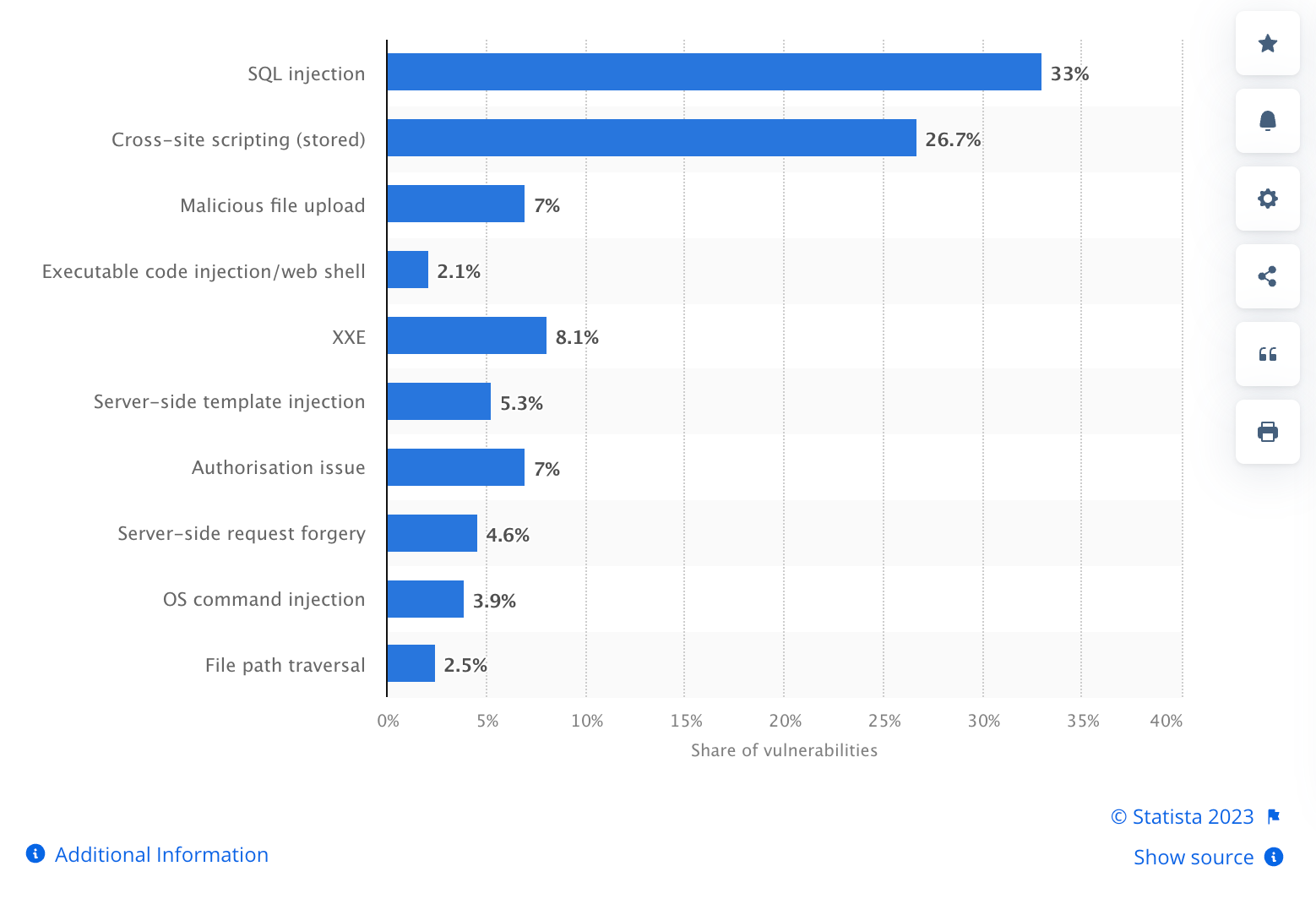Jun 01, 2023
insights,
tech
Top 7 Well-Known Web App Security Flaws and How to Avoid Them in 2023
Web apps have become crucial tools for businesses as well as individuals in an increasingly interconnected society. However, as people become more reliant on these applications, the necessity for strong security measures develops. It's no secret that weaknesses in web app security can disclose sensitive data, jeopardize user privacy, and have disastrous effects. To traverse the developing cyber threat landscape in 2023, it is critical to keep aware about the most frequent vulnerabilities and take proactive efforts to avoid them.
In this piece, we will look at the Top 7 Well-Known Web App Security Flaws in 2023, providing you with useful information and practical solutions to defend your applications. You can ensure the safety and integrity of your web apps while keeping the trust and confidence of your users by knowing these risks and applying effective preventive measures 🛡️
The Importance of Web Security
In today's digital landscape, security is critical for web applications. The growing use of web applications for numerous purposes, such as e-commerce, online banking, and data storage, has increased the risks connected with cyber attacks dramatically. A security breach can have serious implications, ranging from financial losses and reputational damage to the compromise of sensitive user information. Prioritizing online security is therefore critical to ensuring the integrity, confidentiality, and availability of web applications.
Protecting against unwanted access is an important part of web security. This entails putting in place strong authentication procedures to ensure that only authorized users have access to sensitive data or can execute particular operations within the program. Web security requires strong password restrictions, multi-factor authentication, and secure session management. Web applications can considerably limit the danger of unauthorized users obtaining access to sensitive information by enforcing rigorous access controls.

Just look at the facts below (from Terranova Security):
- 17% of cyber attacks target vulnerabilities in web applications.
- 98% of web applications are vulnerable to attacks that can result in malware, redirection to malicious websites, and more.
- Cybersecurity budgets as a percentage of firms’ total revenue jumped 51%, from 0.53% to 0.80%.
- 50% of companies outsource their cyber security operations center.
- The average time to detect a data breach is 118 days.
- 41% of organizations identified hybrid IT situations as their biggest cyber security challenge.
List of Top 7 Web App Security Flaws and How to Prevent Them
1. Cross-Site Scripting (XSS):
Cross-Site Scripting (XSS) is a common web app security vulnerability in which attackers inject harmful scripts into web pages that users view. Developers should use suitable input validation and output encoding techniques to avoid XSS issues. Furthermore, using Content Security Policy (CSP) headers and performing regular security audits might improve protection against XSS attacks.
2. SQL Injection:
SQL Injection is a severe vulnerability that allows attackers to execute arbitrary SQL statements by manipulating user-supplied input. SQL Injection can be avoided by utilizing prepared statements or parameterized queries and ensuring that input is appropriately sanitized and verified. Implementing the principle of least privilege and undertaking extensive security testing can help to reduce risks even further.
3. Cross-Site Request Forgery (CSRF):
Attackers can employ CSRF to deceive users into completing undesired actions without their knowledge or consent. To combat CSRF attacks, developers should utilize strong anti-CSRF tokens, SameSite cookies, and rigorously validate user behaviors. This helps to verify that the application only performs allowed actions.
4. Insecure Direct Object References (IDOR):
Insecure Direct Object References (IDOR) occur when developers expose internal object references in the URLs or parameters of their online applications. Access controls should be built to avoid IDOR vulnerabilities, and sensitive data should not be exposed directly. This danger can be reduced by implementing a strong authorisation process and enforcing appropriate access restrictions.
5. Security Misconfigurations:
When developers mistakenly leave security settings in default or unsafe states, security misconfigurations occur. Regular security audits, patch management, and adhering to secure configuration rules for frameworks, servers, and databases are critical for preventing security misconfigurations. Taking a proactive approach to system maintenance minimizes the danger of exploitation dramatically.
6. Broken Authentication and Session Management:
Unauthorized access and account compromise can occur as a result of poor authentication and session management. Strong password restrictions, multi-factor authentication, and secure session management approaches must all be implemented by developers. Auditing and monitoring user sessions on a regular basis can help detect and prevent suspicious activity.
7. Unvalidated Redirects and Forwards:
Unvalidated redirects and forwards are vulnerabilities that allow attackers to redirect visitors to malicious websites. Developers should check and sanitize all user-supplied redirect URLs and avoid selecting the destination using user-controlled input. These vulnerabilities can be mitigated by using a whitelist approach and using safe redirect methods.
Developers can construct more secure online applications by understanding these well-known web app security issues and adopting best practices for prevention. Maintaining the integrity and security of online applications requires regular security audits, staying up to date on the newest security standards, and teaching developers on secure coding methodologies.
Innovation Feel Team Standing Guard To Secure Your Apps
Our dedicated team of developers at Innovation Feel is driven by creativeness and committed to standing guard to secure your apps. We use cutting-edge technology and best practices to maintain the safety and integrity of your applications, and we have a thorough awareness of the developing landscape of web application security. Based in Ukraine, our staff combines knowledge, innovation, and a desire to provide secure solutions.
Don't hesitate to hire the talented developers at Innovation Feel if you're seeking top-tier IT professionals who value app security. Allow us to fortify your apps and give you the peace of mind you deserve. Contact us to discuss your project and take the security of your app to the next level 🔐